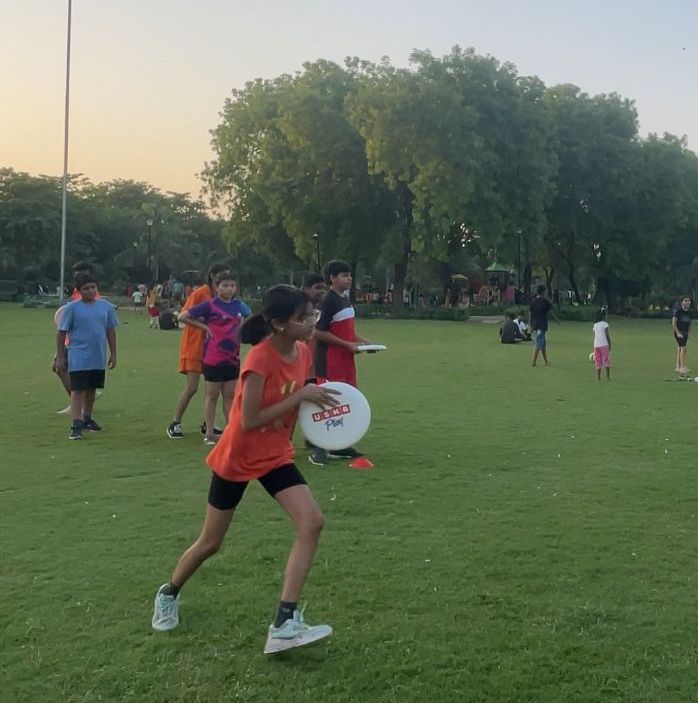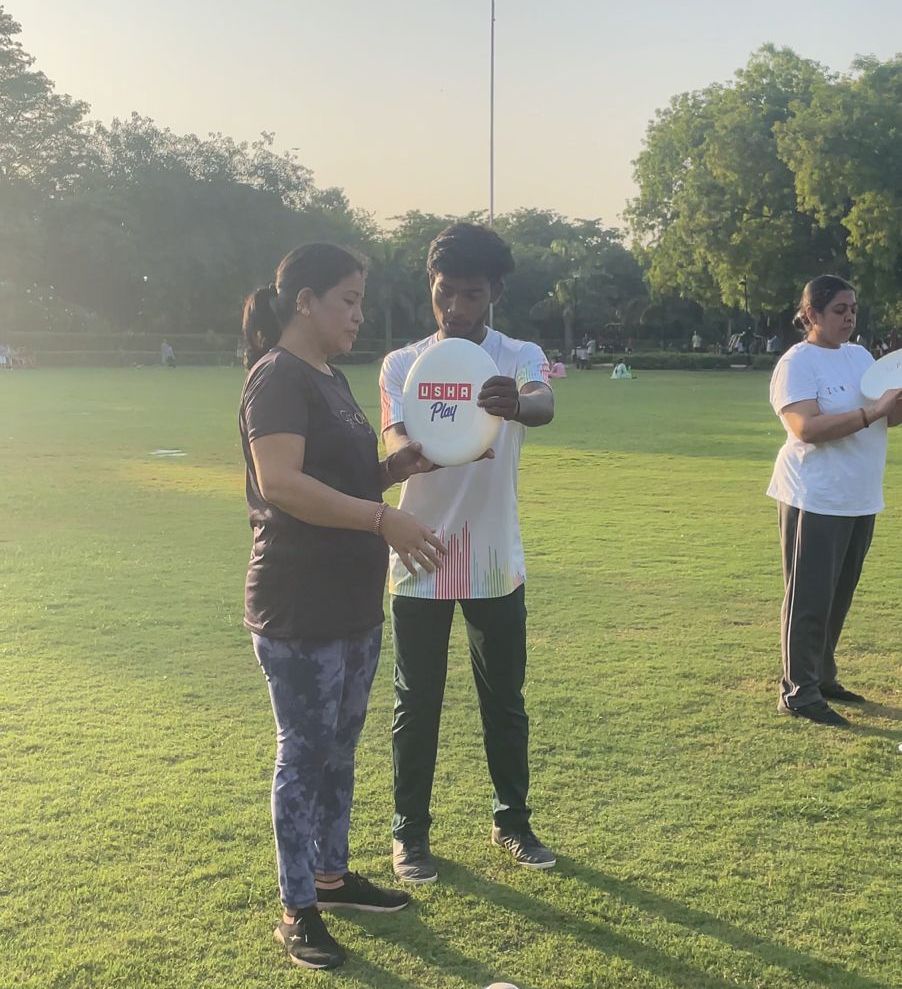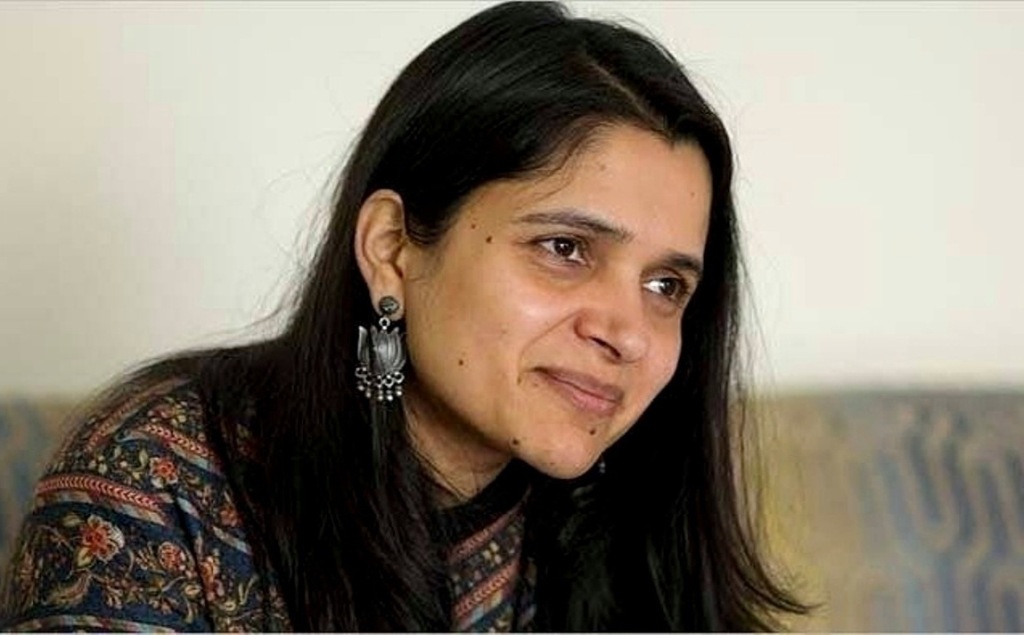 In its mission to create a healthier and more inclusive society, Usha International, a prominent consumer durables brand in India, is making remarkable strides with its sports initiatives. Embodying its brand ethos USHA PLAY, Usha wholeheartedly supports various sports initiatives, particularly for the youth. One of its recent endeavours is the Disc Grant Program, aiming to spread the sport of Ultimate across India, with a special focus on underserved areas. Usha envisions making this sport accessible to children nationwide, instilling a sporting spirit and promoting a healthy lifestyle.
In its mission to create a healthier and more inclusive society, Usha International, a prominent consumer durables brand in India, is making remarkable strides with its sports initiatives. Embodying its brand ethos USHA PLAY, Usha wholeheartedly supports various sports initiatives, particularly for the youth. One of its recent endeavours is the Disc Grant Program, aiming to spread the sport of Ultimate across India, with a special focus on underserved areas. Usha envisions making this sport accessible to children nationwide, instilling a sporting spirit and promoting a healthy lifestyle.
Usha's sports initiatives transcend beyond support for mainstream sports. The company is dedicated to revitalizing traditional Indian sports such as Kalari, Mallakhamb, Siat Khnam, Thang-Ta, and Yoga, embracing their cultural significance and fostering a sense of belonging among participants. Moreover, Usha Silai School women actively participate in organizing, promoting, and competing in these rural sports events, adding an empowering dimension to these initiatives.
In an engaging interview with Ms. Komal Mehra, Head, Sports Initiatives and Associations, Usha International, TheCSRUniverse delves into the company's unwavering commitment to sports and the remarkable impact of its diverse sporting initiatives across India. From empowering underprivileged communities through the Disc Grant Program to igniting a sporting spirit and promoting inclusivity, Usha's approach is nothing short of inspiring.
Join us as we explore how Usha ignites a passion for sports, fostering a healthier and more inclusive society throughout the nation.
Q&A
Q. How does Usha International's brand ethos, Usha Play, align with its vision for promoting sports in India? Please shed some light on some notable sports and associations you support. What has been their impact so far?
A. Partnerships with sports at all levels – national, local, grassroots – aligns with Usha’s ‘Play’ ethos, encouraging people to adopt a healthy and active lifestyle. Giving back to society and community is built into the DNA of the company’s culture, right from its inception. Sports is amongst the most effective ways to support inclusivity across communities, class, and gender, besides teaching participants important life lessons while encouraging them to lead an active and healthy life.
We have been a supporter and promoter of a wide range of inclusive sporting initiatives across the country, including its affiliation with Mumbai Indians, Ultimate Flying Disc, Golf, indigenous Indian regional sports such as Kalari, Mallakhamb, Siat Khnam, Thang-Ta, and Saz-Loung, Satoliya (popularly known as pithu), Yoga, cricket for the specially-abled, sports for visually challenged (athletics, kabaddi, judo, and powerlifting) etc.
The impact varies, of course, where the major sporting associations grow brand salience not just in India but internationally too, the local associations help us strengthen and connect with communities in the deepest pockets of India.
Q. Could you please provide an overview of Usha International's Disc Grant Program, including motivations, goals, distribution process, training components, and impact measurement?
A. Usha’s Disc Grant Program is an initiative which aims to provide world class flying discs across India to spread the sport of Ultimate and the many benefits, physical, cultural, emotional, and psychological therein.
Ultimate flying disc is a sport that is self-refereed, non-contact team sport played in a mixed-gender format in India – a sport that can be played anywhere there is a small ground, making it ideal as a sport amongst kids in lesser privileged areas. Usha’s endeavor is to popularise Ultimate and take it to children across every district, city, and state in the country, with a focus on those in the underserved areas, aligning with Usha's vision of fostering a healthy lifestyle along with a sporting spirit amongst kids.
The first batch of disc grant was given to Y-Ultimate to conduct the recently concluded Ultimate Summer Camp in Delhi. 791 children were impacted directly through the program at 13 different locations through the 4-week program.
Q. How does Usha International collaborate with stakeholders to implement the Disc Grant Program, raise awareness about Ultimate, and ensure sustainability? Any plans for its expansion?
A. To begin with, a pilot program was run in the Delhi-NCR area with Y-Ultimate, an NGO which is also on-board as the selection consultant.
Through this pilot, summer camps were held for children from vulnerable socioeconomic backgrounds across Delhi-NCR aimed at inculcating personal growth and life skills.
During these camps the children and youth learnt the intricacies of the game played using the disc (or a frisbee), along with on-ground lessons in non-violent conflict resolution, respectful communication, self-regulation, and gender sensitivity.
Seeing how the children at these camps evolved during these camps reiterated the potential impact of this initiative, so yes, we are actively seeking partnerships across India to collaborate and identify areas where the Disc Grant can have the right kind of impact on children and youth.
Q. What is the objective behind reviving traditional sports like Kalari, Mallakhamb, Siat Khnam, Thang-Ta, Yoga, etc?
A. India is a truly diverse land with a whole array of traditional local sports so we’d rather revive the local traditional sports and make them fun and aspirational again, for individuals and communities. Our aim is to enable community bonding through games and sports such as Kalari, Mallakhamb, Siat Khnam, Thang-Ta, Yoga, which in turn foster a healthy and active lifestyle. These games represent our true cultural heritage and foster a sense of belonging, along with the multiple benefits.
So as a brand, we have chosen to support the revival of local sports. Further, in some of the rural areas where Usha Silai Schools are present, we also had help from the Silai School women, wherein they helped organizing, promoting, and competing in these events.
Q. What challenges do you face in sustaining and popularizing non-cricket sports, especially traditional ones, in a cricket-focused country? How can these challenges be overcome to generate wider interest and participation?
A. Cricket is deeply ingrained in the culture of our country, and it often helps us in gaining a significant amount of public attention. Today, cricket also enjoys extensive infrastructure in the form of well-equipped stadiums, training facilities, and coaching programs. In contrast, other sports, especially indigenous sports lack similar facilities, making it difficult for them to gain popularity.
We, at Usha, promote non-cricket sports events and leagues, platforms for athletes to showcase their talent, and believe that as sports gain traction, star players will emerge, spurring the entire machinery to up the ante – making it aspirational and inspire young athletes. Through Usha ‘Play’, we invest in upgrading infrastructure for non-cricket sports by partnering with local governments, sports associations, NGOs, and private organizations to establish sports academies, training centers, and playing grounds, making it more accessible and attractive for aspiring athletes.
The idea is to create an environment where traditional sports receive the recognition, support, and exposure they deserve, making them attractive alternatives for both athletes and fans.
Q. How does Usha Silai School empower women leaders in advancing the mission and fostering sports engagement in rural areas, specifically by providing them with diverse opportunities?
A. A community-based, pan India rural initiative, Usha Silai Schools are aimed at skilling women in art of sewing. Usha today has a network of more than 32,000 Silai Schools across the country giving us access to feet on the local streets. Some of these women help us power our local initiatives – as organisers and participants too.
For instance, one of our Silai School Partner, Ms Suman Devi who is a homemaker, entrepreneur, and now also a regional coach for the sport – Satoliya, amongst the first women to have become a coach in the village of Hirapura in Rajasthan. She successfully coaches a team of 11 girls with the aim to reignite the lost spark of traditional sports at the grassroot level.
 Q. Please share examples of the company's inclusive sporting initiatives for the specially-abled sportspersons. Additionally, how do you promote women's participation in sports?
Q. Please share examples of the company's inclusive sporting initiatives for the specially-abled sportspersons. Additionally, how do you promote women's participation in sports?
A. Usha has been a long-time supporter and promoter of a wide array of inclusive sporting initiatives across the country. Amongst these are the IBSA bi-annual National Athletics Championship for the Blind and the Usha Divyang Cricket League.
To further our commitment to supporting gender inclusivity, we partnered with MI Women’s team for their debut T20 League. Partnerships like these help us support players who have courage, determination, and perseverance on and even off the field, and who become role models.
Participation of women in sports promotes gender neutrality and empowers women to challenge and overcome societal/gender stereotypes, allowing them to showcase their athletic prowess, and develop self-confidence.
Q. What collaborative mechanisms do you follow to foster a more inclusive and equitable sports environment in India? What policy-level changes do you recommend to further enhance these efforts?
A. Our aim is to foster a more inclusive and equitable sports environment in India and it’s an area where we are building our expertise slowly, but surely.
At our end we do all we can including Partnering with Non-Governmental Organizations (NGOs), Supporting Grassroots Initiatives, Supporting Women's Sports, Promoting Diversity and Inclusion in Brand Campaigns.
Q. As the Head of Sports Initiatives and Associations at Usha International, could you elaborate on your specific role in promoting sports, including your involvement in the development and execution of the sports initiatives?
A. Sports is an integral part of Usha’s ethos as a company. As a brand, we strive to aspire people from all walks of life to embrace sports and add ‘Play’ to their day-to-day lives. Starting with exploring opportunities at the grassroots level to the international, we leverage each of these to promote a healthy and active lifestyle, while creating gender neutral and inclusive platforms, and the many valuable life lessons learnt on the sports field.
To grow awareness and encourage more and more people to do the same, Usha ensures it is present in the right place at the right time, not just on-ground but in the online space with @Usha_Play.
As a “Play’ team our role demands us to be aware of what’s happening across the country in terms of sports, be sensitized to the local nuances, and most importantly see how it all aligns to our ‘Play’ ethos and Usha’s long-standing brand legacy. With each of these initiatives, whether mainstream or regional, we move one step forward in creating awareness amongst the masses and penetrate deeper.
Q. What is Usha International’s roadmap for the future of their sports initiatives and collaborations?
A. Sports is an integral part of Usha's ethos as a company, and yes, we will continue to grow this in whichever way we can. We have been scaling up our initiatives to reach out to more and more people across the country, building and supporting gender neutral and inclusive platforms, and will continue to do so.
In fact, one of our most recent initiatives is the Disc Grant Program, wherein we provide competition class discs to inculcate a healthier lifestyle amongst kids from underserved areas.
We want to grow this into a pan-India phenomena impacting and influencing thousands of young people who will benefit physically, emotionally, and psychologically as they engage actively to learn the game of ultimate.
During the pilot, 150 competition quality flying discs manufactured by Discraft, USA, were distributed in the camps organized by Y-Ultimate in Darya Ganj, Hathi Basti, Keshavpuram, Kirti Nagar, Kishan Garh, Mayur Vihar, Noida, Pushp Vihar, Sangam Vihar, Sanjay Colony, Shakhur Basti, Seemapuri, Sultanpuri and Tughlakabad, benefitting 700 children.
We actively seek partnerships with local NGOs and organizations to help spread the program’s reach in the deepest pockets of India.





 In its mission to create a healthier and more inclusive society, Usha International, a prominent consumer durables brand in India, is making remarkable strides with its sports initiatives. Embodying its brand ethos USHA PLAY, Usha wholeheartedly supports various sports initiatives, particularly for the youth. One of its recent endeavours is the Disc Grant Program, aiming to spread the sport of Ultimate across India, with a special focus on underserved areas. Usha envisions making this sport accessible to children nationwide, instilling a sporting spirit and promoting a healthy lifestyle.
In its mission to create a healthier and more inclusive society, Usha International, a prominent consumer durables brand in India, is making remarkable strides with its sports initiatives. Embodying its brand ethos USHA PLAY, Usha wholeheartedly supports various sports initiatives, particularly for the youth. One of its recent endeavours is the Disc Grant Program, aiming to spread the sport of Ultimate across India, with a special focus on underserved areas. Usha envisions making this sport accessible to children nationwide, instilling a sporting spirit and promoting a healthy lifestyle. Q. Please share examples of the company's inclusive sporting initiatives for the specially-abled sportspersons. Additionally, how do you promote women's participation in sports?
Q. Please share examples of the company's inclusive sporting initiatives for the specially-abled sportspersons. Additionally, how do you promote women's participation in sports?












.jpg)



